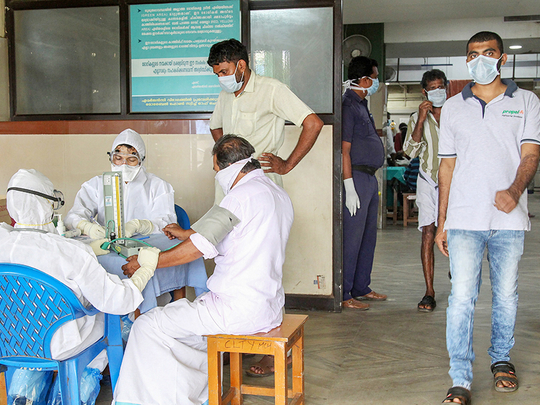
Thiruvananthapuram: The Kerala government on Tuesday took measures to honour the family of Lini Sajeesh, a nurse at the Perambra Taluk Hospital, who died after contracting the Nipah virus while taking care of patients infected by the deadly disease.
The state government has offered a government job for her spouse Sajeesh who is presently working in Bahrain and promised Rs1 million (Dh53,645) each to the couple’s two young children.
“A government job was always Lini’s dream. I am happy, and grateful to the government,” Sajeesh said.
Lini had been working as a temporary staff in Perambra where she showed exemplary courage and a commitment to duty to volunteer to take care of a family whose members were infected with the Nipah virus.
Three of the family members later succumbed to the disease, and Lini who is believed to have contracted the disease from them, also lost her life. Hours before she passed away, she had scribbled a letter to Sajeesh saying “Am almost on the way”. Sajeesh arrived just in time from Bahrain to catch a final glimpse of her before she passed away.
Families of other patients who died owing to the Nipah virus will be given Rs500,000 each by the state government.
Meanwhile, Kerala governor P. Sathasivam has warned people not to be carried away by rumours about the spread of the Nipah virus.
The virus has claimed 11 lives in the state according to the latest reports and the state government has been putting in place measures to arrest the spread of the disease.
The governor advised people to follow the preventive measures advised by the state government and the health department.
Earlier, Chief Minister Pinarayi Vijayan and health minister K.K. Shailaja had also warned people about scaremongers on social media in connection with the disease.
Shailaja said medicines would be imported from Malaysia to tackle the disease. In 1998, the Nipah virus was first reported from Malaysia and Singapore. She said the government proposed to import the Ribavirin anti-viral drug that is believed to have some effect against the Nipah virus.
Some experts believe that there are no effective vaccines available for the disease and that preventive measures are the key to controlling the spread of the disease.
Kozhikode and Malappuram districts in the north of the state have been the most affected by the disease.
Fruit bats are considered the primary cause of infection and people have been warned against consumption of fruits contaminated by bats. Livestock that feed on fruits contaminated by bats are also at risk of contracting the disease.
One comforting aspect is that the disease has not spread beyond the places where they were originally reported, namely Kozhikode and Malappuram districts.
However, the contagious nature of the disease is a cause for concern. That the disease will spread through human-to-human contact was clear when a nurse, Lini Sajeesh contracted the disease while treating affected patients and lost her own life.












